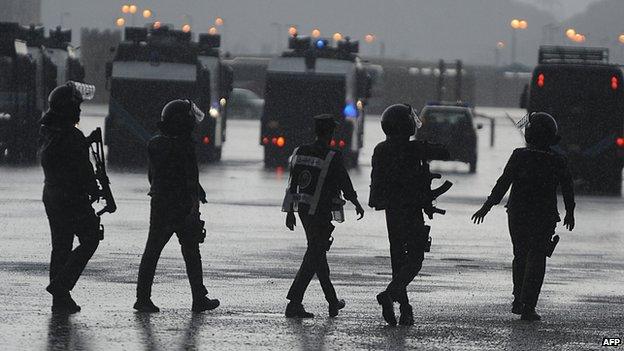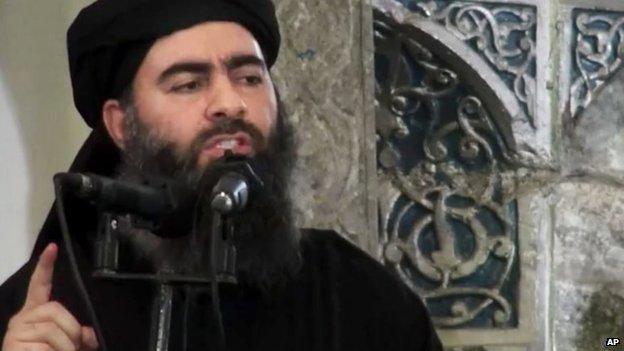Saudi Arabia 'arrests 93 members of Islamic State cells'
- Published

The Saudi authorities say the cell was planning attacks on targets including the US embassy
Saudi Arabia has arrested 93 people suspected of belonging to Islamic State (IS) and foiled several plots, the interior ministry has announced.
The official Saudi Press Agency reported that the arrests had taken place since December and that all but five suspects were Saudi nationals.
The group had set up training sites in a remote area of the al-Qassim region and planned suicide bombings, it added.
Among the alleged targets was the US embassy in the capital, Riyadh.
The Gulf kingdom is part of a US-led coalition carrying out air strikes against IS militants, who control a large swath of Syria and Iraq.
'Deviant group'
The Saudi interior ministry statement quoted by SPA called IS a "deviant group" and said its supporters were seeking to "undermine the security of this country".

IS leader Abu Bakr al-Baghdadi has urged supporters to launch attacks in Saudi Arabia
"They are ceaselessly seeking to achieve this through their criminal plans," it added.
The ministry said those arrested included 65 members of a cell involved in a plot to target "residential areas, and operations to incite sectarian sedition".
Another cell, which included 15 Saudis, was testing car bombs and planning attacks on security headquarters, soldiers and residential areas, the ministry added.
Two Syrians and a Saudi were also allegedly intending to launch a suicide car bomb attack on the US embassy before two of them were arrested in mid-March.
US diplomats halted all consular services for a week from 15 March at the embassy and the consulates in Jeddah and Dhahran, citing security concerns, external.
Shooting suspect held
Earlier on Tuesday, the interior ministry announced that police had arrested a suspected IS operative wanted for shooting dead two police officers in Riyadh earlier this month.
Nawaf al-Enezi, a Saudi citizen, was detained after police received a tip-off that he was at a hideout about 100km (60 miles) east of the capital. He was wounded by police gunfire during the operation.
Another suspect in the shooting of the policemen was arrested last week. He allegedly confessed that he was following orders from IS commanders.
Last November, IS leader Abu Bakr al-Baghdadi called on supporters to launch attacks in Saudi Arabia, but also referred to the country as "Bilad al-Haramayn" - the land of the two holy mosques, meaning Mecca and Medina.
He set out a target list which included the ruling Saud family, Western expatriates, and the country's Shia minority population whom Sunni jihadists view as heretics.
The following month, IS supporters said they had shot a Danish man in his car in Riyadh as he left work. A Canadian man was stabbed a week later in Dhahran.